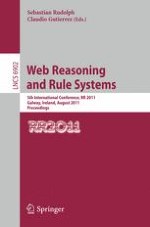This book constitutes the refereed proceedings of the 5th International Conference on Web Reasoning and Rule Systems, RR 2011, held in Galway, Ireland in August 2011. The 13 revised full papers, 12 revised short papers presented together with 2 invited talks were carefully reviewed and selected from 36 submissions. The papers address all current topics in Semantic Web, interplay between classical reasoning approach with welll established web languages such as RDF and OWL, reasoning languages, querying and optimization and rules and ontologies.
